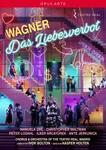|
Back
04/06/2017
Richard Wagner: Das Liebesverbot, WWV 38
Manuela Uhl (Isabella), Christopher Maltman (Friedrich), Peter Lodahl (Lucio), Ilker Arcayürek (Claudio), Ante Jerkunica (Brighella), María Hinojosa (Dorella), María Mirkó (Mariana), Francisco Vas (Pontius Pilate), David Jerusalem (Angelo), David Alegret (Antonio), Isaac Galán (Danieli), Sergio Arce, Santiago Cano, Jordi Casas González, Alvaro Hurtado, Sergio Mariottini, Gabi Nicolás, Amaury Reinoso, Carlos Rodas, Nacho Rodríguez, David Vento (Actor-Dancers), Coro y Orquestra Titulares del Teatro Real, Andrés Máspero (Chorus Master), Rafael Khismatulin (Concertmaster), Ivor Bolton (Conductor), Kasper Holten (Stage Director), Steffen Aarfing (Set and Costume Designer), Bruno Poet (Lighting Designer), Signe Fabricius (Choreographer), Luke Halls (Video Design), János Darvas (Screen Director)
A Teatro Real/Sintonía Media/EuroArts production in co-production with TVE, Teatro Real, Madrid, Spain (March 3 and 5, 2016) – 160’
Opus Arte DVD OA 1191 D (or Blu ray OA 7213 D) – Format 16:9 – Dolby Digital – All regions – Booklet in English, French and German – Subtitles in English, French, German, Japanese and Korean

   
Richard Wagner’s two comic operas are few and far between, his 1862 Die Meistersinger von Nürnberg receiving top billing with Das Liebesverbot a virtual distant second. It’s not surprising why this work is seldom resurrected since its unfortunate Magdeburg 1836 reception revolved around the lead singer forgetting his lines. It didn’t help the musical extraction of Shakespeare’s Measure for Measure when the second performance was cancelled due to a fist fight erupting between singers ahead of a rising curtain. So much for good luck.
Das Libesverbot was never resuscitated thereafter in Wagner’s life...a pity because the opera has its own appeal. Commemorating the 400th anniversary of Shakespeare’s death, Teatro Real’s new staging re-awakens the work through a Steffen Aarfing lens by combining a quasi-contemporary grounding with a broadened timeline in costuming predominately focusing on cabaret pops and Wagnerian Brünnhilde-esque carnival attire. Further, it reinforces Shakespeare’s universal message which taunts excessiveness yet never overburdens in scurrilous overweight.
Das Libesverbot is about a ruling Sicilian hypocrisy, punishing those who indulge in sexual proclivity while similarly violating these mandates through self-indulgence. The light and tuneful music strikes as the antithesis to Wagner’s later style by following more inside boundaries of French and Italian comic opera. The “Overture” sparks immediate attention by use of cymbals and castanets which quickly lead into rapid string progressions turning to Hérold and Bellini while a young Wagner portrait comes to life and emotes to beats of the music...brilliant. It all sets the tone for absurdities to come.
Manuela Uhl assumes the role of Isabella. This lead bears a lot of responsibility; she’s the definitive novice with amazing projection, steely at times on the edges. As she amusingly plays up her piousness, she attempts to rescue her brother, Claudio (Ilker Arcayürek.) Their iPhone (“Telephone Duet”) conversation while Claudio is in prison is clever and feigned with sobriety. Adding to the zaniness, María Hinojosa plays up her character, Dorella, with buoyant sassiness as she attempts to seduce lieutenant Brighella (Ante Jerkunica.) Kasper Holten wonderfully exercises the job of character blocking with nuances of delightful facial expressions. It’s nonstop joy. Christopher Maltman has a great grasp of Viceroy Friedrich that continues to hold imposing substance since his bass-baritone register is sublime. Though the voice is thin and acting is stiff in the first act, Peter Lodahl’s Lucio begins to loosen up as the opera moves into Act II. The innocence of María Miró generates empathy as she sings plaintively about her abandoned husband, Friedrich.
Lighting is a significant factor inside Das Liebesverbot, and this design adds grand substance through the intelligence of Bruno Poet. Particularly energizing is his darkness setting a murky mood inside the Carnival danza which highlights Signe Fabricius’ frenetic choreographic acrobatics. Much of the movement created onstage is handled through a moving conveyor belt carrying singers backwards and forwards during the multitudinous musical parlances. This craftsmanship allows the opera to move forward with fluidity and significant momentum.
There’s much to like in this Das Liebesverbot. Even if one isn’t particularly keen on glancing at Richard Wagner’s comic side, consider a rethink. Here’s an amiable twist of fun.
Christie Grimstad
|